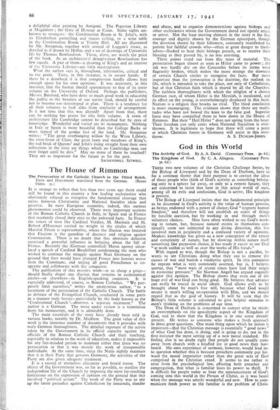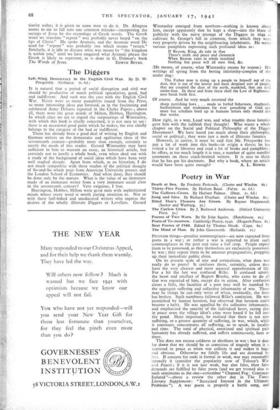God in this World
THESE two new volumes of the Christian Challenge Series, by the Bishop of Liverpool and by the Dean of Durham, have so far a common theme that their purpose is to correct the ideas of those people who think of God's activity as something belong- ing only to a sphere far away, or only to a remote future; they are concerned to insist that here in this actual world of ours, among all its evils and confusions, God is active, His kingdom is present.
The Bishop of Liverpool insists that the fundamental principle to be discerned in God's activity is the value of human persons, as beings endowed with a power of choice; God " respects human freedom," and therefore will not establish an order of things by forcible coercion, but by working in and through men's
voluntary choices. Men have often wished to see God's work- ing in nature, but, because natural events in themselves con- tinually seem not subjected to any divine direction, this has involved men in perplexity and a confused variety of opinions. Modern knowledge has given us a new conception of the extent and complexity of nature, but by showing within nature itself something like purposive choice, it has made it easier to see God " at work within as well as over the works of His hands."
With regard to war, though the Bishop is not a pacifist, he wants to see Christians doing what they can to remove the causes of war and banish a vindictive spirit. In this connexion he repeats what is very commonly asserted, but is, I believe, untrue, that " most wars of recent times have had their origin in economic pressure." Sir Norman Angell has argued cogently against this opinion. The Bishop shows that even out of the huge evil of war God can bring good. He believes that advance can really be traced in social ideals. God allows evils to be brought about by man's free will, because what God would secure is man's willing co-operation with Him, and we should regard that as the goal of history. It will be seen that the Bishop's little volume is calculated to give helpful stimulus to men's thinking on the problems of our time. .
The Dean of Durham is concerned to correct what he thinks an overemphasis on the apocalyptic aspect of the Kingdom of God, and to show that the Kingdom is in one sense already present. He writes as someone who makes a fresh approach to these great questions. One main thing upon which he insists is important—that the Christian message is essentially " good news " of what God has done, is doing, and is going to do, not in the first instance the mere setting up of a new moral standard. His feeling also is no doubt right that people do not usually come away from church with a kindled joy at good news they have heard. My own experience of sermons, however, would lead me to question whether this is because preachers commonly put for- ward the moral imperative rather than the great acts of God comprised in the Christian creed. It seems to me rather to arise from the psychological law, affecting both preacher and congregation, that what is familiar loses its power to thrill. It is difficult for people today to hear the announcement of God's coming into this world in the Person of Christ, as it was heard when the message was utterly wonderful and new. How to com- municate fresh power to the familiar is the problem of Chris-
tianity today; it is given to some men to do it. Dr. Alington seems to me to fall into one common mistake—interpreting the sayings of Jesus by the etymology of Greek words. The Greek word we translate " repent " was probably never heard "on the lips of Christ." He spoke Aramaic, and the Aramaic word He used for " repent " was probably one which means " return." Similarly, it is idle to discuss what was meant by " the kingdom is within you," until we have enquired what Aramaic phrase the Greek is likely to represent, as is done in G. Dalman's book































 Previous page
Previous page